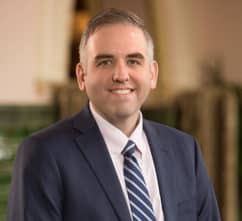While we often talk about the financial aspects of retirement, it’s equally important to consider the emotional, mental and physical facets that accompany the next phase of your life. In this episode of Buckingham Weekly Perspectives, Chief Investment Officer Kevin Grogan shares ten key elements for creating and living a fulfilling retirement.
Transcript:
Kevin Grogan: In most of these videos, we talk a lot about what’s going on in markets today. We’re really diving deep into the academic evidence behind how we invest client portfolios. But today I want to talk more about sort of the softer things or the softer ideas that you need to be thinking about as you move into retirement. And so what I’m going to lean on heavily for today’s video is a book titled “Your Retirement Quest” that was co-authored by Alan Spector and Keith Lawrence. And in that book, they really talk about the things you should be thinking about as you prepare to retire and they identify the ten key elements of a fulfilling retirement. So I’ll highlight each of these with just a couple of thoughts on each one. As in terms of things you should be thinking about as you move into retirement.
Key Element #1: Have a Life Purpose
Kevin Grogan: So the first key element that they mentioned is having a life purpose. And so as you retire, you kind of move out of one phase of your life and into another. And I think it’s only natural that many of us during our working lives kind of identify our life purpose alongside what our job is. So if you are a corporate executive, that’s what you identify your purpose as. And so once you retire, of course, that phase of your life ends and you need to find a new purpose in this new phase of your life.
Key Element #2: Find your Passions
Kevin Grogan: Pretty closely related with that first element is the second element, which is finding your passions. And so it’s very important as you move into retirement to identify what your passions are and try to pursue them as best you can.
Key Element #3: Adopt a Positive Attitude
Kevin Grogan: The third key element is your attitude. So having a positive attitude can make a difference, both in the quality of your life and how long your life actually is. And it’s been found in academic studies that having a positive attitude can add up to seven years to your life. So it is very important as you move into retirement to continue to maintain a positive attitude as best you can.
Key Element #4: Build Financial Security
Kevin Grogan: A fourth key element is financial security. So I won’t spend a ton of time on this one because that’s what the focus of most of our other videos is. But with financial security, really, the main key here is trying to match your lifestyle to the resources that you have available. And of course, having a good financial advisor can be very helpful in identifying what your resources are and whether or not your lifestyle matches up with the resources that you have at retirement.
Key Element #5: Give Back to Others
Kevin Grogan: Fifth key element is giving back. And so there’s good evidence here that supports the idea that by giving back to others, it can actually have benefits to yourself. So it’s been found that retirees who spend a good bit of time volunteering actually have benefits of lower mortality rates, higher functional ability and lower stress. So all of these are benefits to volunteering, at least with some of your time over the course of your retirement.
Key Element #6: Create and Maintain Healthy Relationships
Kevin Grogan: Sixth, is having healthy relationships. So many of us, certainly myself included, a lot of our strongest relationships are with those that you work with on a day-to-day basis. And so once you retire, you need to kind of have a plan for what those relationships will look like after you retire. So having friends, having people that you can interact with is very, very important as you move into retirement.
Key Element #7: Continue to Grow
Kevin Grogan: Seventh is growth. So it’s important to stay mentally active as you transition into retirement. So this can be helpful with, again, your quality of life over time.
Key Element #8: Have Fun
Kevin Grogan: Eighth key element is having fun. So that might be kind of an obvious one, but it’s important to focus on having fun as you retire because that can also have health benefits as you age.
Key Element #9: Focus on Your Well-Being
Kevin Grogan: Number nine is well-being which is it’s kind of the idea that you want to focus on your health. So focus on having good nutrition, having an exercise plan and focus on getting a healthy amount of sleep. And all of these things can contribute to having good health as you age in retirement.
Key Element #10: Create a Retirement Life Plan
Kevin Grogan: And then the last and tenth key element is having a retirement life plan. So while it’s super important to have a diversified investment portfolio, it’s also important to have a diversified portfolio of activities that you’re doing into retirement. And I would encourage anyone who’s not yet retired to really start envisioning and thinking about what their life will actually look like in retirement and start trying it out for size even before you retire. So if you’re going to think about moving to another state, maybe spend a lot of time in that new location before you even retire to make sure that actually fits for what you want to do in retirement. So once again, the name of the book that I’m mostly leaning on here today is called “Your Retirement Quest.” I would encourage you to check that out. And if you do have any questions or anything I’ve covered, please don’t hesitate to reach out to your advisor.
If you have any questions please feel free to drop us a note: buckinghamstrategicpartners.com/contact-us

Kevin Grogan, CFA, CFP®
Kevin Grogan is Chief Investment Officer for Buckingham Wealth Partners, which is comprised of Buckingham Strategic Wealth and Buckingham Strategic Partners. And while it sounds like his job is all about the numbers, what he likes most about his role is the opportunity for him to collaborate every day with advisors, clients and prospects, helping others better understand the complicated concepts that will have a tangible effect on their financial lives. He is a member of the firm’s Investment Policy Committee and helps lead the firm’s investment strategy, portfolio management and fixed income teams.







